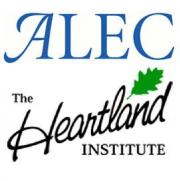As anticipated, former Duke Energy engineer and North Carolina Representative Mike Hager has introduced a version of the American Legislative Exchange Council’s “Electricity Freedom Act” into the state’s General Assembly.
 House Bill 298 would fully repeal North Carolina’s renewable portfolio standard(RPS)–a state law requiring utilities to generate more electricity from clean sources over time. The existing RPS law is credited for contributing to therapid growth of the clean energy sectorin North Carolina.
House Bill 298 would fully repeal North Carolina’s renewable portfolio standard(RPS)–a state law requiring utilities to generate more electricity from clean sources over time. The existing RPS law is credited for contributing to therapid growth of the clean energy sectorin North Carolina.
By introducing a bill to fully repeal North Carolina’s RPS law, Rep. Hager is backtracking on his own promise not to eliminate current renewable energy targets for NC’s dominant utility, Duke Energy. From the Charlotte Business Journal last December:
Hager says he does not support eliminating the renewable requirements. N.C. utilities already have committed to long-term contracts to meet the current level of renewable-energy requirements. So changing the rules could cause problems for the utilities, he notes. That is why he generally favors capping renewables at the current level.
But Rep. Hager abandoned this position, instead marching in lockstep with the American Legislative Exchange Council’s full repeal initiative.
At least seven of the bill’s sponsors areknown affiliates of ALEC, including three of the four primary sponsors–Rep’s Mike Hager, Marilyn Avila, George Cleveland, Rayne Brown, Justin Burr,Sarah Stevens, and Mike Stone.
ALEC has many other members in the NC legislature, including House Speaker Thom Tillis, who just joined ALEC’s national Board of Directors.
 ALEC’s Electricity Freedom Act, the model bill reflected in Rep. Mike Hager’s H298, was born from its Energy, Environment and Agriculture task force and was written by the Heartland Institute, a member of the task force. Other members of ALEC anti-environmental task force include Koch Industries, ExxonMobil, Peabody Energy and Duke Energy.
ALEC’s Electricity Freedom Act, the model bill reflected in Rep. Mike Hager’s H298, was born from its Energy, Environment and Agriculture task force and was written by the Heartland Institute, a member of the task force. Other members of ALEC anti-environmental task force include Koch Industries, ExxonMobil, Peabody Energy and Duke Energy.
Despite heavy public pressure to disassociate from ALEC’s attacks on clean energy, climate policy and other controversial subjects like voter suppression, Duke Energy remains a paying member of ALEC. Duke helped finance ALEC’s conference in Charlotte last spring, where the Electricity Freedom Act was first drafted:
Duke pays heavily for ALECs operationsthey havespent $116,000 on ALEC meetings since 2009, including $50,000 for ALECs May 2012 meeting in Charlotte, NC where Duke is headquartered (Charlotte Business Journal). This well exceeds the top annualALEC membership feeof $25,000.
As I wrote in January, Duke Energy (recently merged with Progress Energy) is now backtracking on their support for North Carolina’s clean energy standard:
This is where ALEC makes things awkward for Duke Energy:the law that Rep. Mike Hager is targeting (2007 SB3) was created with input from Duke Energy, and Duke explicitly opposes ALECs Electricity Freedom Act, the model law to repeal state Renewable Energy Portfolio Standards (REPS). Duke Energy re-asserted its support for North Carolinas REPS law to theCharlotte Business Journallast April andProgress Energy publicly supportedthe law before merging with Duke.
Less than a year ago Duke Energy wasexplicitly opposedto an ALEC RPS repeal in North Carolina. Now Duke’s NC president says they are “open to conversations” on changes to the RPS.
Duke Energy helped pass the RPS lawsin North Carolina and Ohio, another state whereALEC legislatorsare introducingversionsof the Electricity Freedom Act.
Through ALEC, Duke Can Kill Clean Energy Requirements and Get its Money back from Ratepayers:
Surviving text to the RPS law gutted by Rep. Hager’s H298 includes provisions allowing Duke Energy to charge its ratepayers to recover compliance costs from the clean energy requirements. For that text:see 62-133.8.(H) (4) “Cost Recovery and Customer Charges”
BE IT FURTHER RESOLVED, that this Act also recognizes the prudency and reasonableness of many of the renewable contracts and investments and allows for recovery of costs where appropriate;
Not the first time ALEC legislators have attacked NC clean energy:
Sue Sturgis at the Institute for Southern Studies notes that Rep. Hager’s bill isn’t the first legislative attempt to kill North Carolina’s renewable portfolio standard. One of the co-sponsors of Hager’s bill already tried to repeal the RPS law in 2011:
Last year, Rep. George Cleveland (R-Onslow) — among the state lawmakers with ALEC ties —sponsored a billto overturn North Carolinas renewable energy law. It gained no co-sponsors and went nowhere, but the outcome could be different now that ALEC is getting more actively involved in the issue.
Legislators who have taken aim at clean energy incentives have been egged on by corporate interest groups, often with money trails leading back to the Koch brothers, Art Pope, and other wealthy elites. SueSturgis detailed how ALEC and other State Policy Network groups were gearing up to repeal the RPS before Mike Hager introduced his bill yesterday:
Last year, representatives of the groupsgave presentations around the statethat were critical of the state’s renewable energy standard. Among the presenters was Daren Bakst, director of legal and regulatory studies for the John Locke Foundation and amember of ALEC’s Energy, Environment and Agriculture Task Force, which crafted the model law overturning state renewable energy standards.
Joining Bakst were representatives of the American Tradition Institute (ATI), a fossil-fuel industry-funded think tank that was behind acontroversial freedom of information lawsuit against the University of Virginiathat sought to discredit a prominent climate scientist. ATI has alsotargeted state renewable energy programs.
Several years ago, the John Locke Foundation teamed up with the Beacon Hill Institute, a conservative research organization that has received support from the Koch family foundations, to release areportclaiming North Carolina’s renewable energy law was having a negative economic impact.
One of the first groups we can expect to see chime in will be the Beacon Hill Institute. ALEC and other State Policy Network members have used Beacon Hill’s fundamentally flawed reports as the justification for repealing state RPS repeals in NC, KS, OH and other states. See these sources for a debunk of the Beacon Hill papers:
- Synapse Energy Economics analysis:Not-So-Smart ALEC: Inside the Attacks on Renewable Energy
- Maine Morning Sentinel:Anti-renewable-
energy report cited by LePage was funded by fossil fuel interests - Washington Post:Climate skeptic group works to reverse renewable energy mandates
- Center for American Progressreportshows no correlation between state RPS laws and electricity rates.
Beacon Hill will not be alone. We can expect continued support for the clean energy attack fromArt Pope’s front groupslike theJohn Locke FoundationandtheCivitas Instituteand otherState Policy Networkaffiliates funded by Pope, the Koch brothers, andDonors Trust.
This is exactly what is happening with the Kansas clean energy standard: representatives of several State Policy Network groups including the Beacon Hill Institute, the Heartland Institute, the American Tradition Institute’s Chris Hornerswarmed into Kansas to support the RPS repeal.
As the debate around Mike Hager’s bill unfolds, we’ll see who the Kochs send in to support his effort.


